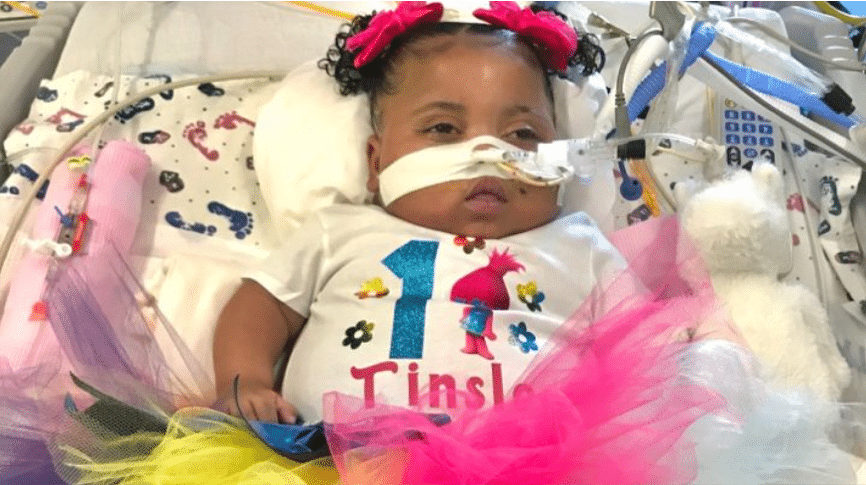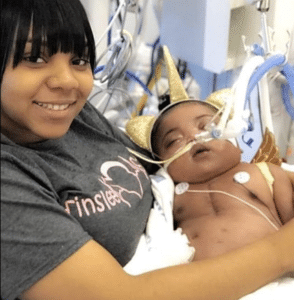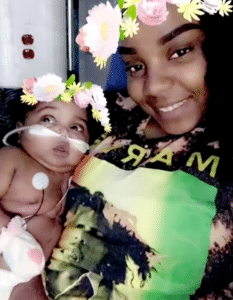
The U.S. Supreme Court has sided with the mother of Tinslee Lewis just a month before the child's second birthday.
Tinslee was born prematurely with an Ebstein's anomaly, a rare and often terminal heart disease. She has been on life support for most of her life while being cared for at Cook Children's Medical Center in Fort Worth, TX.
Ebstein anomaly is a rare heart defect that's present at birth (congenital). In this condition, your tricuspid valve is in the wrong position and the valve's flaps (leaflets) are the incorrect shape. As a result, the valve does not work properly.
Blood might leak back through the valve, making your heart work less efficiently. Ebstein anomaly can also lead to enlargement of the heart and heart failure.
According to the Mayo Clinic, mild forms of Ebstein anomaly might not cause symptoms until later in adulthood. Signs and symptoms might include:
- Shortness of breath, especially with exertion
- Fatigue
- Heart palpitations or abnormal heart rhythms (arrhythmias)
- A bluish discoloration of the lips and skin caused by low oxygen (cyanosis)
In Tinslee's case, doctors are fighting to unhook Tinslee's ventilator under a Texas rule allowing them to refuse treatment if there is nothing more they can do for her.
The hospital’s legal basis for removing Tinslee from life support comes from the Texas Advance Directives Act, which allows hospitals to stop treatment of a patient if a panel determines further treatment is causing unnecessary suffering without hope of recovery. While doctors have the right to deny care under common law, the act outlines a dispute-resolution process and protects the hospital from legal ramifications.

In the first trial over Tinslee in January 2020, a Texas Fourth District Court of Appeals Chief sided with the hospital. A judge ruled that the baby could be taken off life support against the family’s wishes, leading to a series of appeals by the family and the hospital.
In August 2020, after going back and forth, the hospital appealed an unfavorable decision in the July that year and asked the Texas Supreme Court to review the case. They argued that Tinslee continued to suffer, and that the appeals court’s decision unlawfully declared a central provision of the Texas Advance Directives Act unconstitutional.
With the federal Supreme Court denying the hospital’s petition, Tinslee will remain on life support.
Tinslee’s mother, Trinity Lewis, says her daughter is not suffering and experiences joy just like other children, like when her nails are painted or when her favorite movie is playing.
According to multiple reports, Keeping a patient on life support in an intensive care unit bed costs, at a minimum, $2,000-$4,000 per day and can run much higher depending on the patient's condition, into hundreds of thousands a year.
Doctors usually advise stopping life support when there is no hope for recovery -- your organs are no longer able to function on their own. Keeping the treatment going at that point may draw out the process of dying and may also be costly. Choosing to remove life support usually means you'll die within hours or days.
When a treatment is clearly futile and it will no longer achieve its “clinical” objective and no longer offers a physiological benefit to the patient, then obviously, there should be no obligation to continue to provide the treatment.
Medicare will usually pay for a short stay in an approved skilled nursing facility, under the following conditions:
- You have had a recent previous hospital stay of at least three days;
- You are admitted to a Medicare-certified nursing facility within 30 days of your prior hospital stay, and;
- You require skilled care, such as specific nursing services, physical therapy, or other types of therapy.
Medicare will pay for hospice care if you have a terminal illness and are not expected to live more than six months. When you qualify for hospice care, Medicare covers the costs of drugs used to manage the illness and provide relief from pain, provide support services from a Medicare-approved services provider and certain other services Medicare normally does not cover, such as grief counseling.

When it comes to Tinslee's case, the hospital did not argue that expense was a factor in their desire to end life support, but the child's well-being. Stay tuned to see how this plays out. Either way, we pray, wish and hope for the best for the child and the family.








